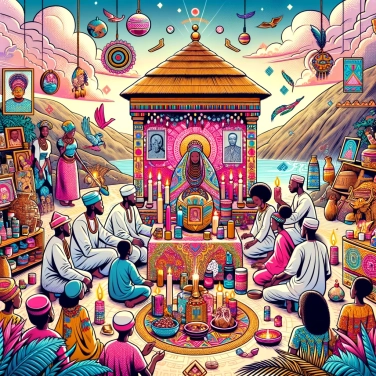The worship of ancestors is important in many African cultures because it is seen as a way to maintain the connection between the living and the deceased, ensuring continuity and social cohesion.

In many African cultures, ancestors represent the fundamental pillars of collective identity. Through family narratives, songs, and ceremonies, they pass down precious memories of the community's origins and history from generation to generation. Their remembrance provides a sort of cultural reference point that helps each individual know where they come from and which values truly resonate with them. Losing this connection to ancestors risks the gradual erasure of traditions and know-how that define the uniqueness of a community. They serve as a compass indicating the direction to maintain in order not to forget one's roots and to remain true to one's cultural identity.
In many African cultures, ancestors are the glue that holds the community together. Their memory allows different generations to come together regularly around ceremonies or traditional festivals, thereby strengthening family bonds and social cohesion. These rites become significant moments where everyone realizes they belong to a long family chain, that they are dependent on others, and that they have a specific place in the community. One feels united: celebrating the ancestors together is a reminder to all that we share the same history, the same collective identity, beyond individual differences.
In many African communities, ancestors are seen as protectors who are always present, capable of intervening in the daily lives of the living. People regularly turn to them for support, to attract good fortune, or simply to receive important advice for the choices to be made in life. For example, in some families, it is common to make small offerings or prayers to the ancestors before a marriage, a birth, or a new project. The idea is that these ancestors, in exchange for the respect and attention given to them, closely monitor the actions of their descendants, ensure their safety, and prevent the younger generation from repeating mistakes made in the past. This daily closeness to their ancestors helps people feel guided, reassured, and actively connected to their roots.
In most African cultures, honoring the ancestors is an effective way to learn, from a very young age, what is right or wrong. The stories of the elders, told around a fire or during ritual ceremonies, clearly demonstrate which actions are courageous, just, or generous, and which ones lead to shame or misfortune. Observing the respect that adults show to the ancestors naturally encourages the young to adopt positive behaviors. As a result, the ancestors become somewhat like timeless role models, whose lives teach wisdom, integrity, solidarity, and humility. No grand speeches, just concrete examples drawn from the lives of those who came before.
In several African cultures, ancestors play the essential role of intermediaries between the visible world of the living and the invisible world populated by spirits or deities. Why them? Well, because they have lived here on earth, they are intimately familiar with our struggles and hopes, while now being situated in a spiritual dimension. It is thanks to their special position that ancestors allow the living to communicate with the invisible, conveying requests, wishes, or even prayers, and bringing back to earth blessings, advice, or warnings from the spirits. In some African traditions, this communication occurs during rites or ceremonies, through a medium or simply through dreams and everyday signs. In short, they are somewhat like respected messengers, able to make the necessary connection between our two worlds.
In many African cultures, the naming of a newborn is influenced by ancestors, as it is believed that the child will carry the qualities or spirit of the ancestor after whom they are named.
Many African peoples have ancestral altars dedicated in their homes or villages, where they regularly bring symbolic offerings to maintain family and community harmony.
The cult of ancestors generally does not regard deceased individuals as distant or inaccessible, but rather as always present and influential in everyday events.
Griots, the famous storytellers or traditional historians in West Africa, often use the connection with ancestors to narrate community stories, keep traditions alive, and strengthen moral values across generations.
The worship of ancestors often includes ritual ceremonies, prayers, food offerings, drinks, or symbolic goods. Family members typically gather around a family altar, a specific sacred place, or even directly at the graves of their ancestors.
Ancestors are perceived as experienced spirits who observe the community from the spiritual world. They protect the family and the community, advise the living through dreams, visions, or signs, and also guide them in making important decisions.
According to common belief, neglecting the ancestors leads to social imbalance, bad luck, illness, or conflict. Neglected ancestors may be seen as troubled spirits seeking to draw attention to their neglect, thus prompting communities to restore ancestral worship rites.
Yes, practices vary widely according to regions, cultures, and ethnicities. While some communities prioritize festive and collective celebrations, others adopt more discreet and private rites that are tailored to their specific historical, cultural, and environmental context.
No, ancestor worship is not strictly considered a religion. It is more of a spiritual and cultural practice that allows the living to honor, communicate with, and stay connected to their deceased ancestors.

0% of respondents passed this quiz completely!
Question 1/5